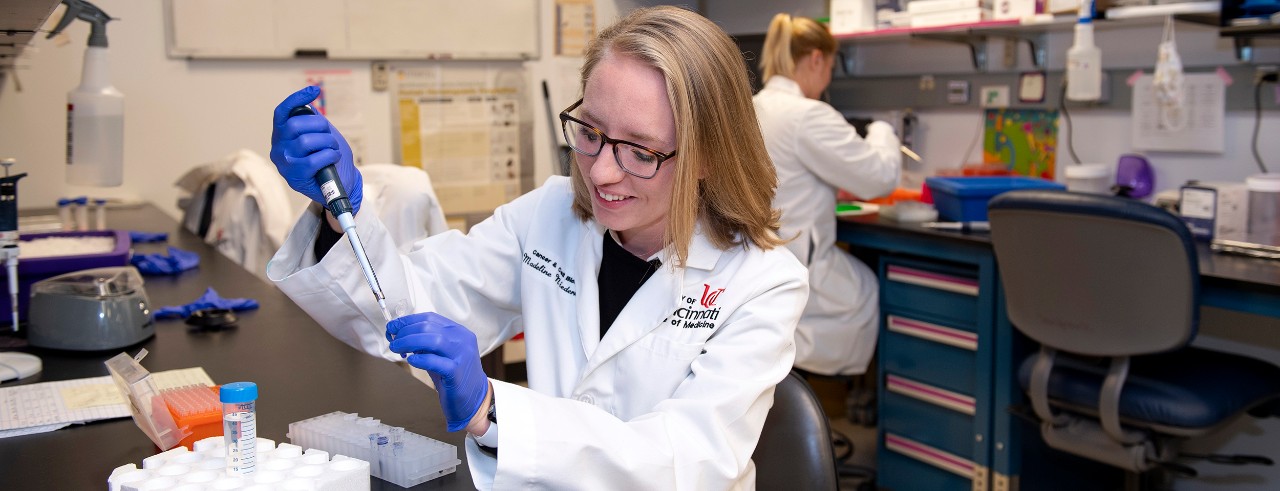
UC graduate student receives National Cancer Institute award
Young investigator advances our knowledge of acute myeloid leukemia
Madeline Niederkorn, a fifth-year graduate student in the University of Cincinnati (UC) College of Medicine, is hoping to further our knowledge of two related cancers: acute myeloid leukemia (AML) and myelodysplastic syndromes (MDS).
A young investigator in the Department of Cancer and Cell Biology, Niederkorn has been studying these abnormalities since her time as an undergraduate biological sciences major in the laboratory of Daniel Starczynowski, PhD, professor in the Department of Pediatrics and researcher at Cincinnati Children’s.
“We are focused on understanding the mechanisms of these diseases using a variety of cellular assays, protein assays and in vivo studies in mice,” says Niederkorn.
“We are looking to identify novel and rational therapeutic targets for myelodysplastic syndromes and acute myeloid leukemia,” says Niederkorn. “What I mean by that is are there proteins and specific pathways in these cells that are different from the healthy cells in the blood and bone marrow that make them uniquely targetable? Rather than giving patients chemotherapy, which can be broadly applied and has many side effects, we are trying to identify targeted therapeutics that have less toxic side effects for patients.”
Niederkorn’s work has captured the attention of the National Cancer Institute (NCI), which offered her a $75,910 Predoctoral to Postdoctoral Fellow Transition Award for the project “Regulators of Ubiquitin Signaling in Malignant Hematopoiesis.” The agency’s grant support is given to encourage and retain outstanding graduate students recognized by their institutions for their high potential and strong interest in pursuing careers as independent cancer researchers. One student per institution is permitted to apply and only 24-30 awards are made nationally per year.
The award will facilitate the transition of talented graduate students into successful cancer research postdoctoral appointments, and provide opportunities for career development activities relevant to their long-term career goals of becoming independent cancer researchers.
MDS are conditions that can occur when cells in bone marrow responsible for creating blood become abnormal and fail to produce effective mature peripheral blood cells, explains Niederkorn. In AML, the bone marrow accumulates immature white blood cells causing leukemia to spread through the blood stream and into other parts of the body, she says.
AML is the second most common leukemia type in adults with doctors diagnosing an estimated 19,520 cases in the United States in 2018, according to NCI. An estimated 10,670 deaths occurred last year because of AML. Around 13,000 people in the United States are diagnosed with MDS annually.
Niederkorn, 25, of Eastlake, Ohio, says she decided to pursue an advanced degree in the sciences after affirming near the end of her senior year at UC that she loved science and the critical thinking required in the discipline.
“My last year of undergrad I was torn at how to best apply that and I started thinking about my experiences in the lab and what I liked about it,” says Niederkorn. “Then I became saddened by the idea of graduation and having to leave the lab. I had a lot of conversations with faculty and other students in the Cancer and Cell Biology program about the prospects of me completing a PhD. I really was motivated by the process of asking a scientific question and then taking steps to find the answer.
“My plan is to pursue an academic postdoctoral position after my PhD,” says Niederkorn. “I would ultimately like to operate my own research program as an independent investigator.”
A grateful Niederkorn says NCI’s backing offers her some needed flexibility in moving forward with a career in science.
“I have the support and the necessary encouragement and motivation to pursue creatively what I want to study during a post-doctoral fellowship,” she says. “That will give me a little bit more intellectual freedom to carve my own path in science. The funding will follow me wherever I decide to accept a postdoctoral position. Those resources will allow me to do the science I want to do.”
Starczynowski says Niederkorn will continue to make her mark in the scientific community.
“Maddie is a rising star and exhibits an impressive curiosity and tenacity for tackling the difficult and critical questions in leukemia biology,” explains Starczynowski. “Although most trainees gravitate towards translational studies, Maddie also recognized early on the importance of understanding the fundamental biological processes underlying leukemia as a means to uncover novel therapeutics opportunities.”
Photos by Colleen Kelley/AHC
Next Lives Here
The
University of Cincinnati is classified as a Research 1 institution by the
Carnegie Commission and is ranked in the National Science Foundation's Top-35
public research universities. UC's graduate students and faculty investigate problems
and innovate solutions with real-world impact. Next
Lives Here.
Related Stories
From research to resume: Grad Career Week prepares students for career paths
February 20, 2026
Graduate students at the University of Cincinnati will explore how their academic and creative work translates into professional success during Grad Career Week, March 2–6, a week-long series of workshops, networking opportunities, and skill-building sessions hosted by the Graduate College.
Blood Cancer Healing Center realizes vision of comprehensive care
February 19, 2026
With the opening of research laboratories and the UC Osher Wellness Suite and Learning Kitchen, the University of Cincinnati Cancer Center’s Blood Cancer Healing Center has brought its full mission to life as a comprehensive blood cancer hub.
Scientists: Slushy snowmelt isn’t just a nuisance
February 13, 2026
Slushy snowmelt isn’t just a nuisance, scientists say. It can send a toxic flood of road salt, sand and car exhaust, as well as dog poop, into rivers and streams, The University of Cincinnati College of Medicine's Yevgen Nazarenko, PhD, assistant professor of environmental and industrial hygiene in the Department of Environmental and Public Health Sciences, recently told The New York Times that research has shined a light on how pollution from all sorts of vehicles — planes, cars, trucks — can get trapped in the snow.
